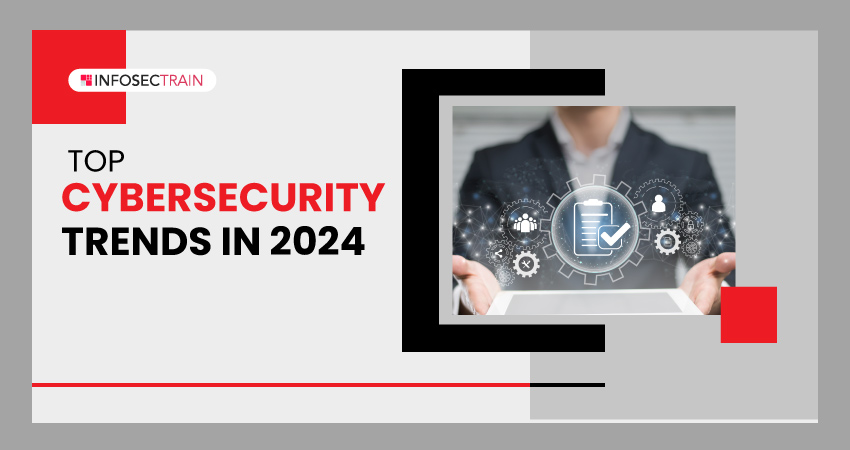Top Cybersecurity Trends in 2024
As we embrace the digital age, the cybersecurity landscape constantly changes due to rapid technological advancements, emerging threats, and transformative innovations. 2024 marks a crucial year in the realm of cybersecurity, with the emergence of new trends that will revolutionize the way organizations and individuals safeguard their digital assets. In this age of interconnected systems, cybersecurity trends are set to transform defense mechanisms significantly, redefine threat landscapes, and pave the way for a more robust and proactive approach to countering cyber threats. From the proliferation of AI (Artificial Intelligence) to the growing next-level phishing attacks, the adoption of zero-trust frameworks, and the increasing prominence of cybersecurity in critical infrastructure, this exploration delves into the key trends poised to shape the cybersecurity landscape in the coming year. Understanding these evolving trends is pivotal in fortifying our defenses and staying ahead in the perpetual cat-and-mouse game between cyber defenders and adversaries.

Top Cybersecurity Trends in 2024
In the projected cybersecurity landscape for 2024, numerous significant trends are expected to impact the industry substantially. These trends will present challenges and opportunities for individuals, professionals, and organizations alike.
- AI-driven Cyber Attack Surge: Cybercriminals are turning to Artificial Intelligence (AI) to automate attacks, making them harder to detect and prevent. AI capabilities will be utilized to pinpoint software vulnerabilities, craft convincing phishing emails, and execute ransomware attacks.
- Scarcity of Cybersecurity Skills: The demand for cybersecurity professionals continues to outpace the available talent pool. By 2024, this shortage is predicted to exacerbate, creating a substantial skills gap. With the rapid advancement of technologies and the increasing complexity of cyber threats, there is a growing demand for highly skilled professionals who excel in areas like threat detection, incident response, secure coding, and ethical hacking.
- Escalation of Cyber Warfare and State-Sponsored Cyber Attacks: Geopolitical tensions are evident in the digital realm as nation-states become more involved in advanced cyber warfare strategies. Expect an increase in the frequency and complexity of state-sponsored attacks targeting critical infrastructure, government entities, and businesses. These attacks can cause significant disruptions, steal valuable information, or compromise essential systems, severely threatening national security and global stability.
- Next-level Phishing Attacks: Phishing attacks are expected to become more sophisticated, leveraging advanced techniques and tactics like AI-driven personalized content, deepfakes, and targeted spear-phishing campaigns, making them more convincing and challenging to detect. These highly tailored attacks target individuals and organizations, exploiting psychological manipulation and social engineering techniques. Increasing user awareness and implementing strong email security measures is essential to combat these threats.
- Supply Chain Ransomware Targeting: Ransomware attacks, which are becoming more prevalent and already cause billions of dollars in losses annually, are shifting their focus toward supply chain services. These attacks are projected to specifically target supply chain services crucial to various businesses’ operations, potentially causing substantial harm to the global economy.
- Economic Strain Impacting Security: The global economy faces several challenges, including rising inflation, supply chain disruptions, and the war in Ukraine. These factors are likely to strain corporate budgets, which could lead to cuts in cybersecurity spending. This could make organizations more vulnerable to cyberattacks. Maintaining adequate cybersecurity budgets and updated business continuity plans becomes imperative.
- Collaboration in Cybersecurity: Cybercrime is a global problem that requires a global solution. By 2024, we expect to see increased collaboration between governments, law enforcement agencies, and private sectors to combat cybercrime. This collaboration will be essential to developing effective strategies for detecting, preventing, and responding to cyberattacks.
- Metaverse Security Concerns: The metaverse is a new virtual reality platform that is gaining immense popularity. However, its expansion and increasing popularity pose new cybersecurity challenges and risks, offering attackers new avenues for launching diverse cyberattacks. Some security concerns associated with the metaverse include privacy risks, cyberattacks within virtual environments, and virtual asset theft.
- Stringent Data Privacy Regulations: Data privacy regulations evolve worldwide, compelling organizations to fortify their data protection measures to comply with regulations.
- Zero-Trust Security Adoption Surges: The adoption of zero-trust security models gains momentum. This approach assumes distrust of all users and devices, regardless of their position within the network perimeter. Authentication and authorization are mandatory for all users and devices accessing resources. With escalating cybercriminal sophistication and the migration of data and applications to the cloud, zero-trust security is becoming increasingly critical.
How can InfosecTrain Help?
As cybercrime continues to surge at an alarming rate globally, it becomes increasingly imperative to possess comprehensive cybersecurity knowledge to safeguard businesses and individuals from evolving threats. Acquiring expertise in cybersecurity not only offers a significant edge in today’s competitive landscape but also acts as a crucial shield against the rapidly expanding realm of cybercrime.
InfosecTrain offers comprehensive professional cybersecurity and cloud certification training courses, equipping individuals with the essential skills needed to thrive in this dynamic field. Collaborating with our seasoned cybersecurity professionals ensures fortified defenses for your business against potential threats. For newcomers eager to embark on a cybersecurity career path, our Cyber Security Orientation Program online training offers an excellent starting point to acquire essential skills and knowledge in this dynamic field.





 1800-843-7890 (IN)
1800-843-7890 (IN) sales@infosectrain.com
sales@infosectrain.com
 1800-843-7890 (India)
1800-843-7890 (India) 
